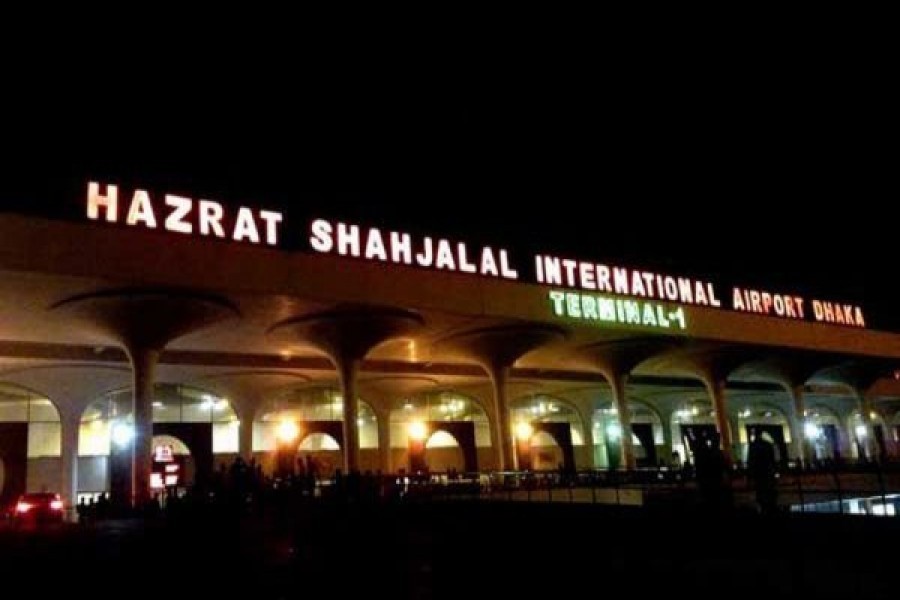More international carriers may be allowed to operate to and from Dhaka

Published :
Updated :

The Civil Aviation Authority of Bangladesh (CAAB) is set to allow more international airlines to operate flights here because of a favourable regulatory policy, vibrant market and high profitability.
However, local airline operators have been fighting to survive as the CAAB has failed to safeguard their interests.
It was learnt that five airlines of the UK, Iraq, Iran, South Korea and Indonesia have recently applied to the CAAB for flight operations in Bangladesh.
The CAAB has hinted to give permission in the new year.
Overall air traffic growth is 5.0 per cent, but it is 8.5 per cent in Bangladesh with 10-per cent cargo growth.
The International Air Transport Association projected that passenger growth would be 2.0 per cent globally by 2036, but it would be 3.5 per cent for Bangladesh.
Many airways, including Oman Air and Etihad, once suspended their operations in Bangladesh because of low profitability.
British Airways left Bangladesh 12 years ago in 2009.
The UAE-based low-cost Air Arabia, Fly Dubai, Emirates and Etihad operate here alongside lucrative routes like Kuala Lumpur, Singapore, Doha and Muscat where Bangladeshi airliners have most potential.
On the other hand, Biman Bangladesh Airlines, Regent Airways and US-Bangla Airlines had a good business in Oman.
The CAAB permitted Salam Air, which is a low-cost, budget carrier. Oman Air also operates now. This has created obstacles for Bangladeshi operators.
Local carriers cannot compete with these airlines as they get various state facilities which help them lower their fare.
They even get duty- and tax-free jet fuel from Bangladesh, whereas local carriers even do not get credit facilities for jet fuel.
The domestic carries have to procure pre-paid fuel, let alone waiver of duty and tax, making the competition uneven for them with their international rivals.
On the other hand, Biman alone operated to Delhi at a fare of Tk 35,000 to Tk 40,000 while Chennai route was dominated by US-Bangla, a private carrier.
But the CAAB has allowed Indian Go Air and Vistara which have lowered the fare to Tk 18000-20,000.
Experts said the CAAB has been providing favourable policy for giant international carriers but cannot protect the interests of local airliners.
Some CAAB officials have been doing it for personal interests, they alleged.
CAAB and foreign ministry have also failed to realise their rights in connection with the air service agreement by ensuring equal flight frequency in various countries or getting operating permit.
The national flag carrier Biman has a rich fleet of 19 aircraft, most of which are brand new.
It has four Boeing 777-300 ER, two Boeing 787-9 Dreamliner and four Boeing 787-8 Dreamliner, six Boeing 737-800 and three Dash-8 400.
Three more Dash-8 are in the pipeline.
Biman has stopped flight operations in most destinations excepting seven domestic routes.
It mostly carries point-to-point traffic to Middle East, Malaysia, Singapore and the UK. Besides, it is highly dependent on hajj and Umrah pilgrims.
About the loss incurred during coronavirus pandemic for over seven months and a prediction about recovery, Novo Air senior manager (marketing and sales) Mahfuzul Alam Polash said there is no scope to recover the loss.
There was an opportunity to minimise the loss by raising fare which could not happen, he told the FE.
It is also not possible to predict when the company will reach its break-even point as the expense has increased and revenue income has fallen.
"We had a plan of fleet and international route expansion by adding three small aircraft and three mid-size Airbus 320 or 321 by next year which we've totally postponed."
"We had a plan to operate flights to Singapore, Doha, Muscat and Kuala Lumpur alongside Chennai, Guwahati and Bagdogra of India," Mr Polash mentioned.
Now there is a plan to increase frequency in domestic routes only, he cited.
An industry insider said most of the local airlines like GMG and United Airways closed their operations over the past 25 years.
"Foreign carriers are not bringing foreign passengers to Bangladesh, rather they are carrying Bangladeshi passengers. Then how come the policy is congenial for the industry?" he posed a question.
"If the 30 per cent passengers carried by the local airliners could be raised to 50 per cent then we could have said the policy is good."
Referring to Biman, he said most of the profitable routes like Jeddah, Dammam, Kuwait, Muscat and Riyadh where Biman were carrying labourers are suspended.
But Biman has a whole brand-new fleet with so many wide-body aircraft, he added.
CAAB chairman Air Vice-Marshal Mofidur Rahman did not respond to the FE's repeated attempts for comment.
Aviation and tourism magazine Bangladesh Monitor editor Kazi Wahidul Alam said foreign ministry and the CAAB have failed to realise the rights in connection with the air service agreement.
It is reciprocal as every country under the agreement will get same share of flight frequency which Biman and many other airlines have not got, he pointed out.
Foreign ministry and the CAAB have to sort it out by handling the issue diplomatically, Mr Alam suggested.
Local airliners, including Biman, have to go for interline partnership, code-sharing and networking to increase their market share. No airline can survive by carrying point-to-point traffic, he said.
msshova@gmail.com


 For all latest news, follow The Financial Express Google News channel.
For all latest news, follow The Financial Express Google News channel.